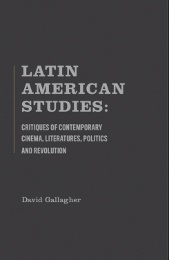Latin American Studies: Critiques of Contemporary Cinema, Literatures, Politics and Revolution
Ph.D Royal Holloway College; Cambridge University; winner of the Farnworth Prize, Author of Comedy in Contemporary Literature, 2009
 “...a well chosen and absolutely fascinating discussion of Latin American literary and cultural life today emphasizing the region's dialogue with the world as an equal and not as a magical realist , protean revolutionary, or Bolanian construct . Virtually all contributors are Latin American or Caribbean scholars with first class credentials. Recommended for library collections.”
“...a well chosen and absolutely fascinating discussion of Latin American literary and cultural life today emphasizing the region's dialogue with the world as an equal and not as a magical realist , protean revolutionary, or Bolanian construct . Virtually all contributors are Latin American or Caribbean scholars with first class credentials. Recommended for library collections.”
Professor Helga Gates,UNE
Latin American Studies examines variously several current themes in Latin American creative life: the theme of disability in contemporary Peruvian-Mexican writer Mario Bellatin’s works, an analysis of the American poet William Carlos Williams together with hispanophile Waldo Frank and the Peruvian José Carlos Mariátegui highlighting the intersection of English and Spanish-speaking Americas; biographical accounts of Latin American figures, confronting the traditional literary criticism that views Latin American writing as an echo of either American or European authors. Cervantes is argued to be the main influence on Gabriel García Márquez rather than William Faulkner, gender is examined in Edwidge Danticat’s writings of the Haitian revolution. Other writers under consideration include the Puerto Rican novelist Edgardo Vega Yunqué, comparison of the Mexican Fernando Del Paso’s playful and encyclopaedic style contrasted with the Cuban José Manuel Prieto’s intercultural and new baroque style. Antes que anochezca the memoirs of Reinaldo Arenas openly deal with homosexuality, and his fantastic blend of fact and fiction which portrays Cuba, Castro and Revolutionary persecution with passion, anger and biting mockery, is transformed significantly by Julian Schnabel in his film adaptation of the memoir, Before Night Falls (2000).
The focus switches to Argentina with the next contribution that uses queer theory to read the historical and artistic specificities of the strangeness of Argentine Lucrecia Martel’s cinema. The collection continues with a consideration of how young filmmakers intervene in the formation of collective memory about the last Argentine dictatorship. Next, Dos veces junio, written by Martín Kohan, and Marco Bechis’ Garage Olimpo, insist on new ways of representing the past as part of a traumatic experience of Argentina’s violent political regime.
ACADEMICA PRESS
1727 Massachusetts Avenue, NW, Suite 507
Washington, DC 20036
